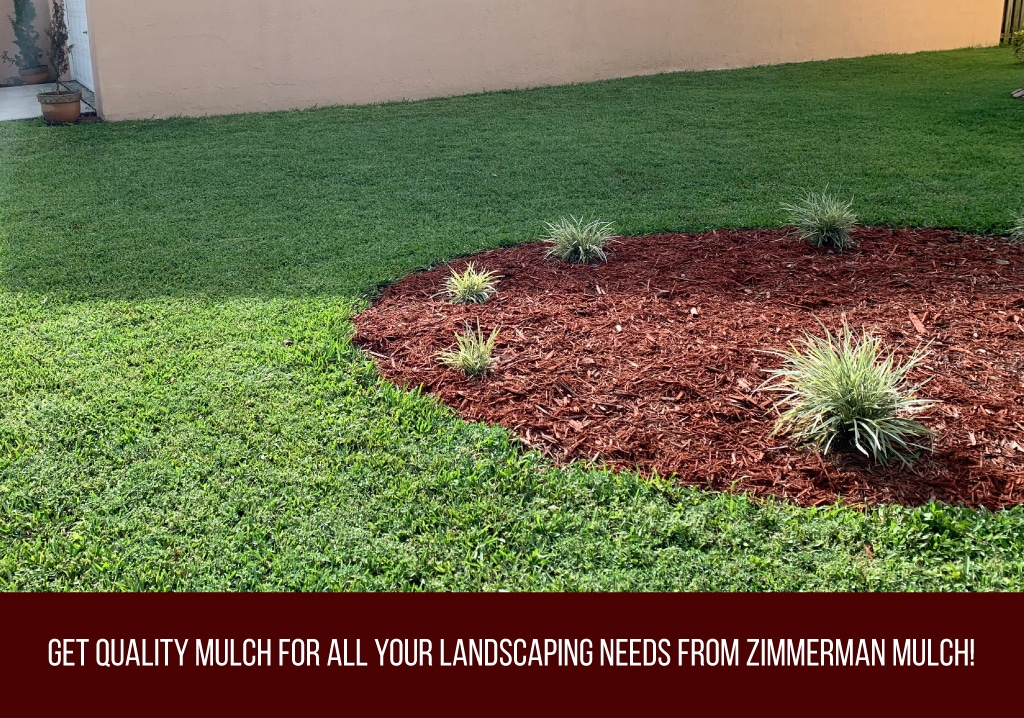10 Main Types of Mulch [+10 tips on spreading it!]
Few things clean up a property more than freshly mulched flower beds and who doesn't love the sight of a clean, weed-free landscape? It’s enough to make anyone excited for summer!
With there being multiple different varieties of mulch such as: bark mulch, hardwood mulch, wood chips, and even mushroom soil mulch one may wonder about the differences between them.
At Zimmerman Mulch, we understand you want to select the perfect mulch for your situation, helping you achieve the most outstanding results! And we also know that you might need more information to do that.
But good news, we have prepared this article just for you!
We will look at some of the different types of mulch and what you can use them for. Then, as a bonus, we will give you insider access to professional tips for mulching your property.
Ready to go?
Let’s dig in!
What is Mulch?
Let’s start with the basics. What do we mean when we say mulch?
When we use the word mulch, we usually refer to the typical ground/shredded and composted bark we put on our flowerbeds to control weeds and improve aesthetics.
But mulch can include much more than that.
By its basic definition, mulch is anything used to cover the ground to prevent weeds, enrich the soil, maintain temperature, or prevent water evaporation or erosion.
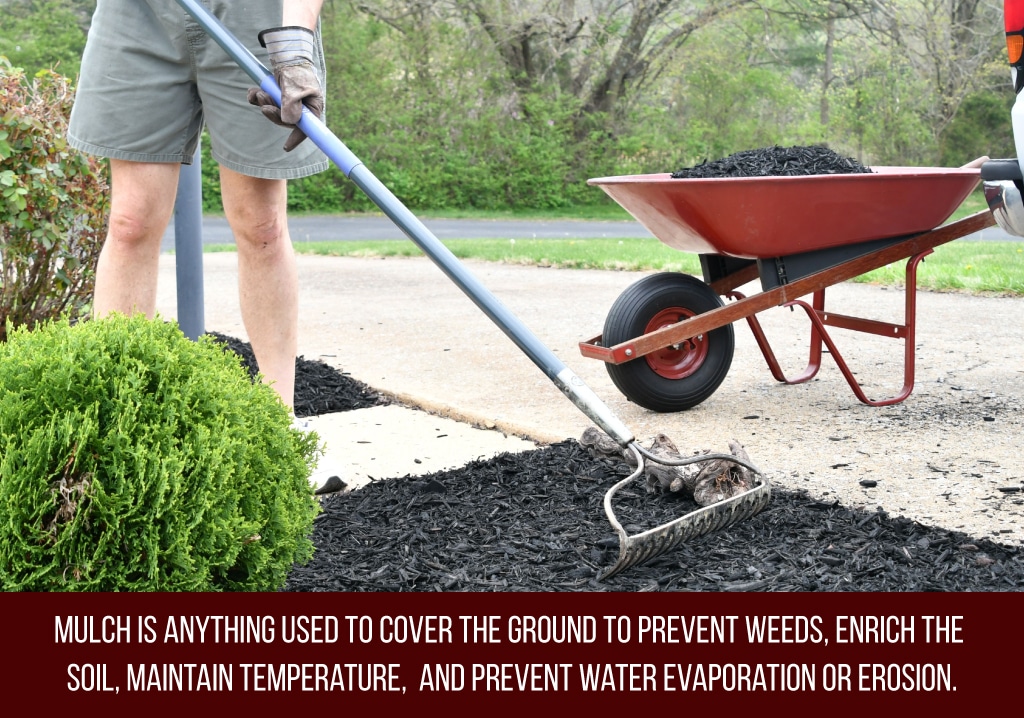
So mulch can include anything from the typical bark mulch that most people think of when they hear the word to cardboard laid down to prevent weeds. It could also include straw, grass clippings, plastic, or composted leaves.
As you can see, it can cover a lot! (no pun intended:))
Now that we know more about what we mean when we say mulch, let’s take a look at some different types of mulch and their uses.
Types of Mulch
Different types of mulch are used for various purposes.
Some types of mulch specialize in enriching the soil or aiding in water retention. Others are better for weed control or exhibit better aesthetics.
Mulch comes in two basic categories: Organic and Inorganic.
Organic mulch is biodegradable and made from organic materials like bark or straw. These mulches improve soil nutrients, aeration, and drainage. However, because they biodegrade, they need to be replenished regularly.
Inorganic mulch is made from non-biodegradable plastic, rubber, or stone materials. Inorganic mulches are superb weed control products and usually improve aesthetics, but they do not provide any enrichment for the soil.
Let’s look at the different products available within each broader category.
Types of Organic Mulch
Bark Mulch
Bark mulch is made of shredded tree bark aged to a deep brown.
Note: Since aged mulch is more composted than fresh mulch, it is better for new plants that need lots of nutrients. Fresh mulch, by contrast, takes longer to decompose. This means it lasts longer than aged mulch, but its soil-enrichment properties are not nearly as high at the time of application. Always keep the age of your plants in mind when choosing between fresh or aged mulch.
Because bark mulch is made of the tree’s outer bark instead of its hard inner wood, it decomposes quickly, making it one of the best mulches for adding nutrients to the soil and also great for moisture retention.
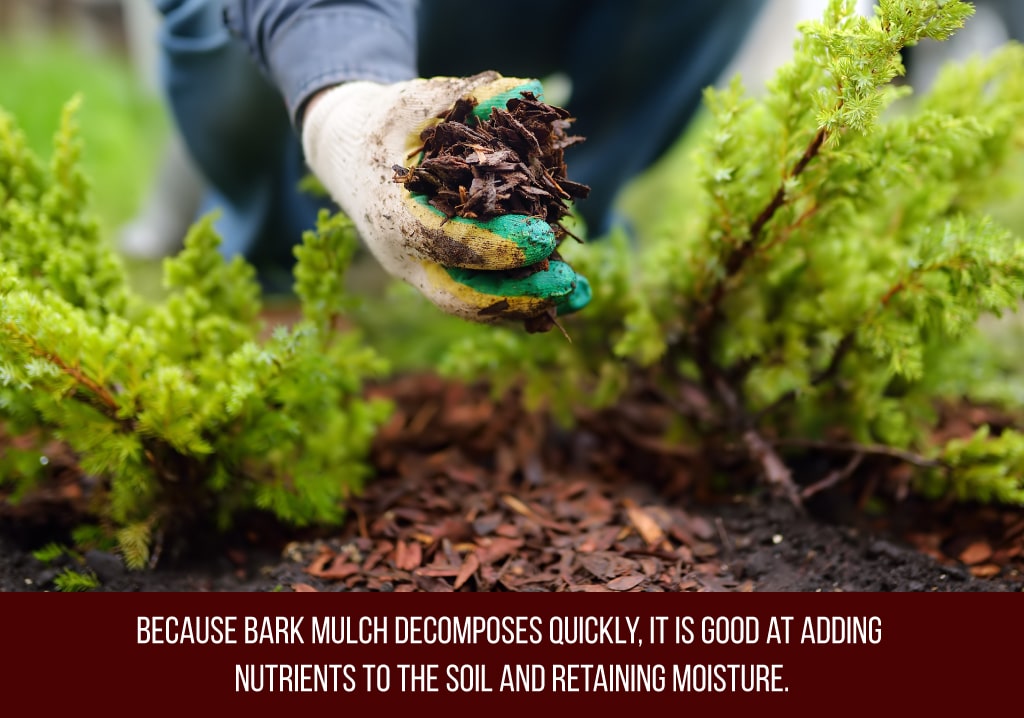
The texture of bark mulch varies with different manufacturers. Generally, the finer the texture, the better the mulch is for the soil.
At Zimmerman Mulch, we make our premium bark mulch out of nearly 100% hardwood tree bark and age it for a year. Our bark mulch comes undyed in its rich, natural brown color.
Hardwood Mulch
Hardwood mulch is similar to bark mulch but contains a mixture of tree bark and shredded hardwood. Because it includes hardwood, this mixture must be double-ground to achieve the desired finer texture. It is then screened to filter out any remaining sticks or chunks of wood. Hardwood mulch is sometimes aged before selling and at other times is sold fresh. It ages to a similar deep brown color as our premium bark mulch.
Hardwood mulch decomposes much slower than bark mulch meaning it lasts longer but the downside is it doesn’t add as many nutrients to the soil.
At Zimmerman Mulch, we produce fine, double-ground hardwood mulch from fresh, clean wood. Unlike other companies, our hardwood mulch contains very little pallet wood (a filler used to stretch mulch), which results in a much cleaner product. Our Nature Blend Mulch is a great economical mulch that is aged to a dark color and works well on general landscapes, woodland borders, or trail surfaces.
Our hardwood mulch also comes dyed in several rich colors.
Color-Dyed Mulch
If you would like a different color than the traditional dark brown mulch, or if you would like a mulch that retains its hues longer, color-dyed mulch could be a good option.
Using all natural coloring, the mulch is dyed to prevent fading. Undyed mulches may fade to gray within a month or two, whereas dyed mulches can retain their vibrancy giving excellent curb appeal through out the year.
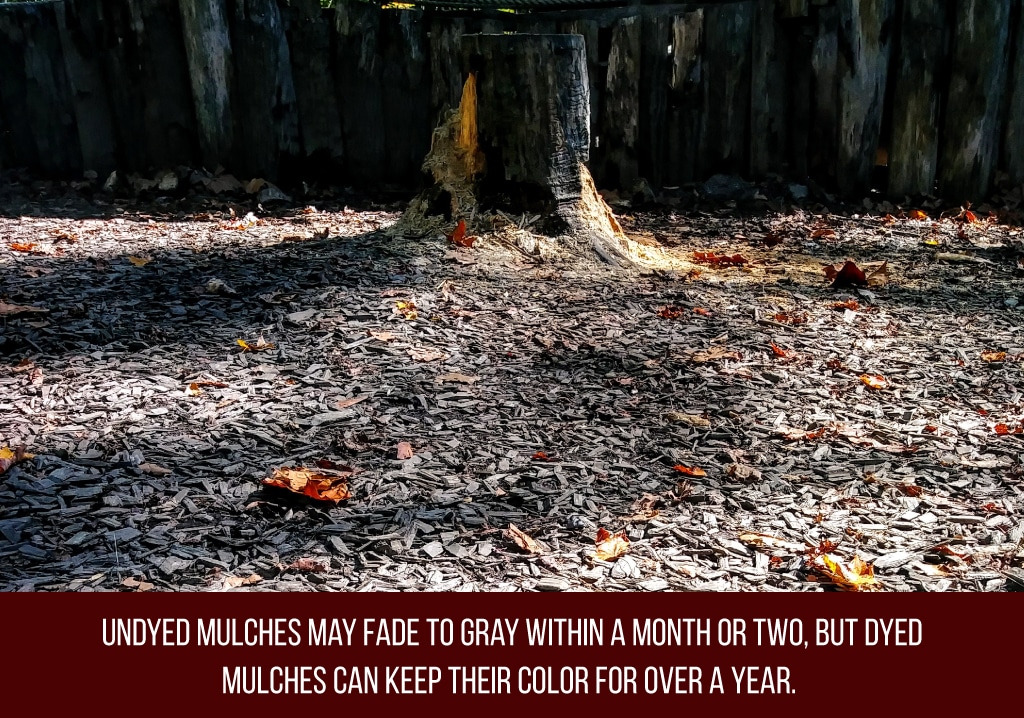
Dyed mulch comes in brown, black, shades of red, and more. You can select the color that best complements your house and landscaping.
At Zimmerman Mulch, we carry several options of dyed mulch, including Colonial Black hardwood mulch, Coffee Brown hardwood mulch, and Beauty Bark mulch.
Playground Mulch
Zimmerman Mulch provides quality, durable Playground Cover for recreational spaces. By providing excellent shock absorption it is perfect for playground areas, walking trails, and dog kennels. Our Playground Cover is IPEMA Certified, so you can enjoy the peace of mind that you are getting the best product for your playground area.
Mushroom Mulch
Mushroom mulch is a vibrant mixture of straw, animal manure, and other organic materials. Mushroom growers have developed this mixture to grow their mushrooms, and when it’s no longer suitable for this, they sell it as mulch.
This type of mulch provides an abundance of great nutrients for the soil, holds moisture well, and decomposes quickly.
You can use it as a nutrient-rich mulch for your flowerbeds, sprinkle it on your yard as a fertilizer, or mix it into the soil in your vegetable garden or flower pots.
However, we don’t recommend using mushroom mulch around trees or shrubs as it holds water and tends to remain damp. The moisture attracts insects and diseases, which can hurt the trunks or stems of the plants. Mushroom soil also tends to be more alkaline, so it should not be used extensively around acid-loving plants such as shrubs and evergreens.
At Zimmerman Mulch, we sell mushroom mulch made of straw, horse manure, and other organic materials, which will significantly benefit your lawn or flower beds.
Wood Chips
Wood chips are simply chips of 100% wood. Wood chips are similar to playground mulch but typically are much larger pieces.
Since they are made entirely from hardwood and are not aged, they last a long time before decomposing. This means you won’t have to reapply them very often.
Wood chips are usually cheaper because they are readily available and require less processing. This makes them a good choice for covering large areas such as picnic areas, or walking trails.
Wood chips are not a great option for flower beds, as you have probably guessed. They pull water and nutrients from the soil, depriving your plants of the necessary nourishment instead of adding anything to soil fertility.
For best weed control in large areas, we recommend putting down a layer of plastic or landscaping fabric as a barrier, then layering wood chips on top for an attractive appearance.
Zimmerman Mulch carries clean, quality hardwood chips in a light to medium brown color.
DIY Mulch Options
Mulch doesn’t have to be complicated!
You can use your grass clippings as mulch for your flowerbeds. Grass clippings help conserve moisture and add nutrients to the soil. However, at some stages of composting, grass clippings can be very acidic and may contain residual lawn treatment chemicals.
Straw and hay are great options for mulching your flower beds, garden, or newly planted grass.
Other DIY options you could try:
- Leaves shredded with a mower
- Sheets of cardboard
- Shredded paper
- Composted materials (Here are some tips on making a compost pile)
- Ground-up corn stalks
- Coffee grounds
As you can see, there are many options in the organic mulch category.
Now let’s look at some of the inorganic types of mulch.
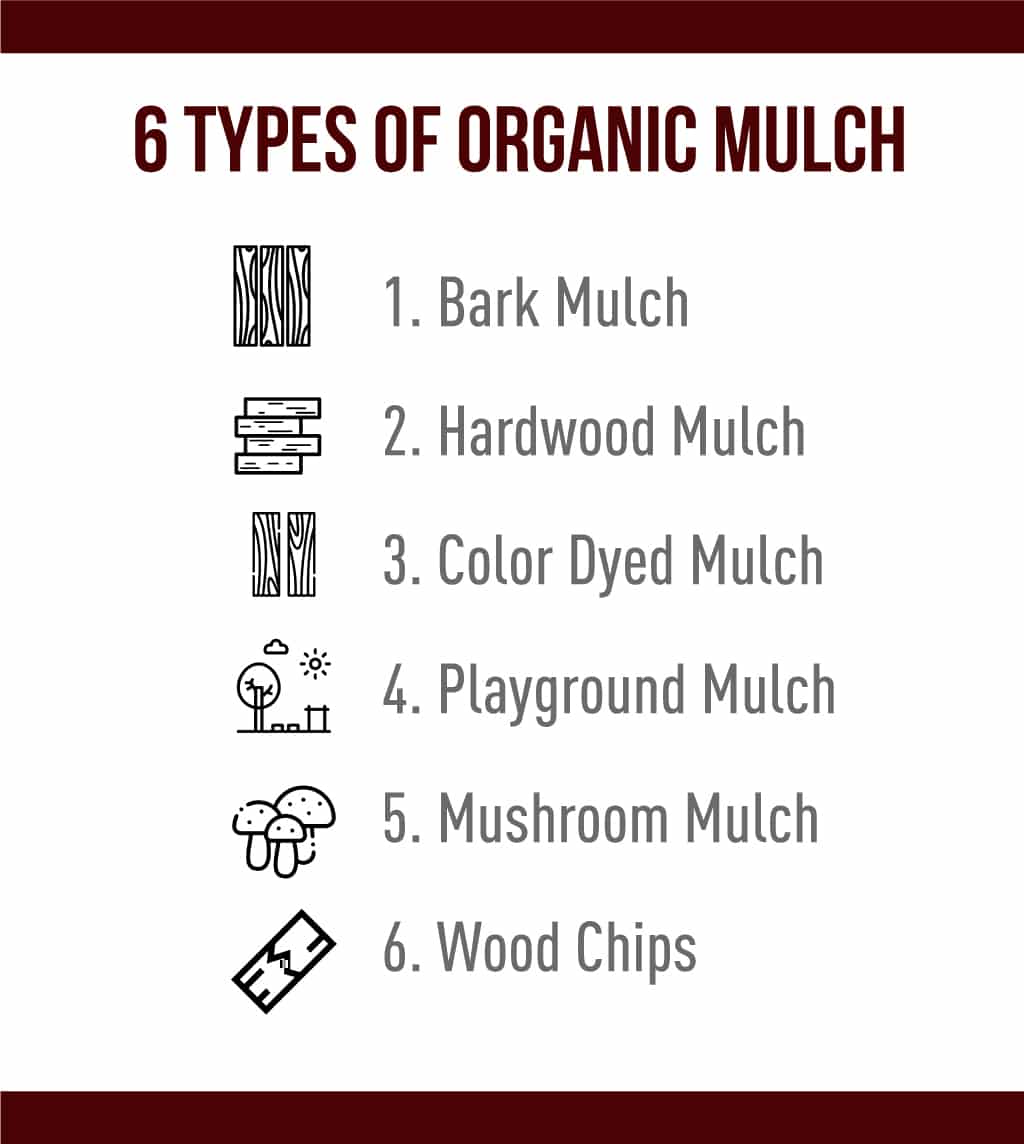
Inorganic Mulches
Inorganic mulches do not enrich the soil or add any nutrients to it. In some cases, they may even prevent nutrients from reaching the ground. But they usually improve the aesthetics of a landscape and aid in weed control.
Inorganic mulches may cost more initially than organic mulches, but they are often more cost-effective because they do not need repeated reapplication.
Here are some standard options for inorganic mulches.
Chipped Rubber
Chipped rubber is usually made from old tires ground up into bits.
The benefits of using chipped rubber over wood chips are that the rubber will not rot, compact, dry up, or hold moisture and will last for years without replacement.
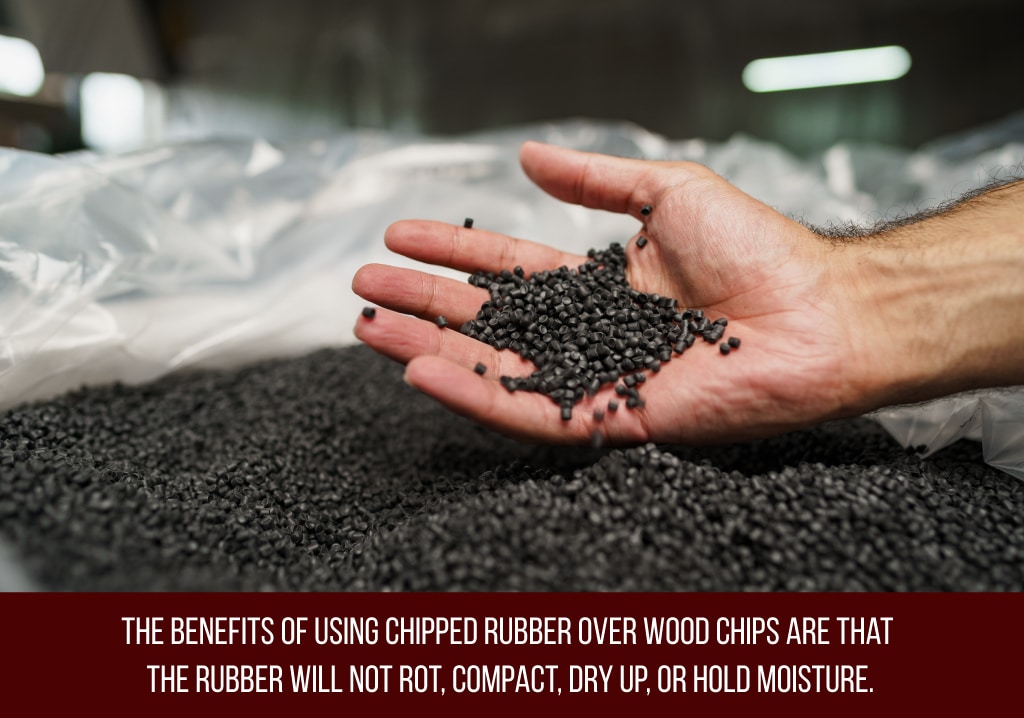
Rubber chips also provide excellent shock absorption, making them a good option for playground areas.
Rubber chips work well for covering any large area since they keep down weeds and provide a clean walking surface. They can even be dyed in a variety of colors for added attractiveness.
Gravel/Stone
Did you know you can use gravel as mulch on your flower beds?
There are several benefits to using gravel as a mulch. It will keep down the weeds without rotting, quickly washing away, or compacting, and it can last years without replacement.
And for some people, gravel provides the exact look they desire for their landscaping.
However, gravel will not benefit your soil and is not an excellent option for moisture retention. It is also not very comfortable to walk on with bare feet.
If you need gravel, peruse our excellent selection of gravel and stone at Zimmerman Mulch!
Landscaping Fabric
Landscaping fabric technically falls under the mulch category because it keeps weeds down.
Landscaping fabric is a barrier against weeds, allowing water and air to circulate. You can layer gravel, traditional mulch, or other landscaping materials on top of landscaping fabric to create an attractive appearance.
If you want a less expensive option, you can always choose plastic. However, since plastic will not allow air and water to enter the soil, it is not a good long-term option.
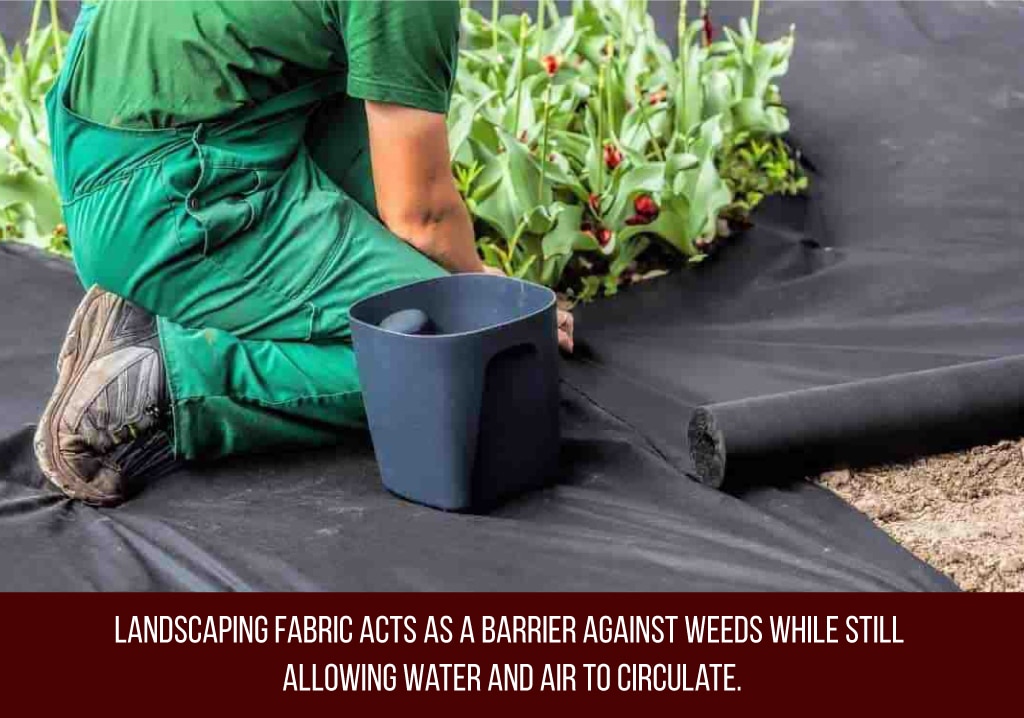
Most people don’t understand all the options available regarding mulch. We hope that you now understand them a little better.
When you fully understand the different types of mulch, you can make an informed decision about which type is best for your needs. If you still have questions, we would happily help you!
Now for the bonus!
Let’s look at some helpful tips for using traditional mulch.
Tips for Applying Mulch
Here are some professional tips to make your mulching painless and effective:
- Mulch in the spring and autumn for best results.
- If your mulch is delivered in bulk, lay down a tarp to dump it on. This makes for easy cleanup!
- Apply a weed preventer such as Preen or Treflan.
- Don’t spread your mulch too thickly or too thinly. 2-2.5" is a good depth to aim for.
- If there is a thick layer of old mulch in the bed, remove it or rough it up before adding new mulch over it.
- Wear gloves. Although often all natural, color-dyed mulch can stain your skin and nails.
- Distribute the mulch evenly. This makes your flower beds much more attractive.
- Make basins around trees and bushes instead of piling the mulch around the trunks or stems. A basin captures needed water for the plant instead of letting it run off and keeps the mulch from smothering and damaging the plant stem.
- Make sure all leaves and plants are free of mulch before you finish.
- Use a garden rake or pitch fork to distribute mulch evenly.
- Spread color-dyed mulch when the weather is dry. The colors in dyed mulch can bleed onto concrete walkways or driveways if the mulch becomes wet before it has time for an initial dry-out in your landscaping.
conclusion
Congratulations! Now you understand the different types of mulch and their best uses. We hope this proves helpful the next time you prepare to mulch your flower beds.
Our team of landscaping experts would be happy to assist you with every step of your mulching needs, from choosing the mulch to delivery to installation.
Working with Zimmerman Mulch is easy:
- Choose the products you would like.
- Purchase your products.
- Install them yourself, or reach out to us for a contractor recommendation in your area who can install them for you!
- Sit back and enjoy your refurbished landscaping!
We also have other landscaping products at Zimmerman Mulch, such as dirt and soil, hardscape materials, outdoor living supplies, and more!
Give us a call today!
We look forward to hearing from you.
